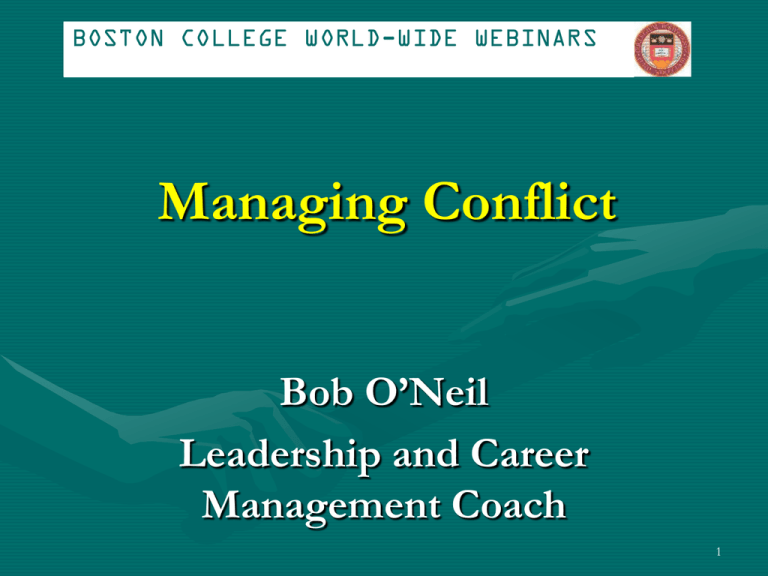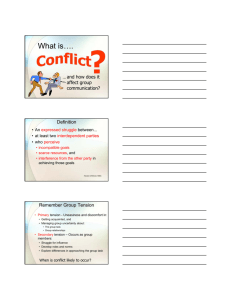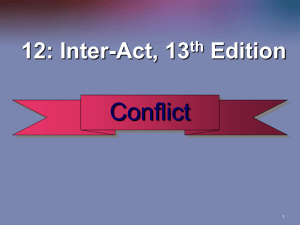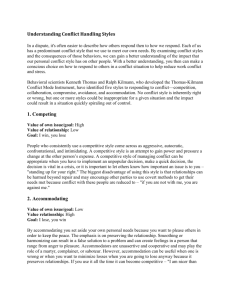Managing Conflict Bob O’Neil Leadership and Career Management Coach
advertisement

BOSTON COLLEGE WORLD-WIDE WEBINARS Managing Conflict Bob O’Neil Leadership and Career Management Coach 1 Agenda for today • Explore new ways to become more effective in conflict situations • Become more aware of five different conflict management styles • Recognize how and when to use of each conflict style • Better understand how to make appropriate adjustments to become more effective 2 What is Conflict? Any situation in which your concerns or desires differ from those of another person. 3 What is Conflict Management? Conflict management is the practice of identifying and handling conflict in a sensible, fair and efficient manner. 4 General Causes of Conflict • Poorly defined goals and objectives • Competition for scarce resources • Unclear roles or lack of job description • Shifting priorities • Lack of communication • Personality conflict 5 2008 Study by CPP, Inc • 2.8 hours per week dealing with conflict • $359 billion in paid hours • 385 million workday 6 Conflict Management Styles COMPETE COLLABORATE COMPROMISE AVOID ACCOMMODATE 7 Different styles have different goals • Competing: Win! • Accommodating: Yield • Avoiding: Delay • Collaborating: Participation • Compromise: Middle ground 8 Conflict Management Styles COOPERATION / CONCERN FOR OTHER 9 ASSERTIVENESS / CONCERN FOR SELF Conflict Management Styles COOPERATION / CONCERN FOR OTHER 10 Avoiding Conflict 11 ASSERTIVENESS / CONCERN FOR SELF Conflict Management Styles AVOID lose / lose COOPERATION / CONCERN FOR OTHER 12 Avoiding Unassertive and Uncooperative When to use: • • • • • Issue is trivial Little can be gained Know when to postpone Avoid emotional conflicts You know your limitations • Allow others ownership 13 Avoiding Unassertive and Uncooperative When to use: Be aware of? • • • • • •Perception that you don’t care •Allows conflict to simmer •Hope is not an effective strategy Issue is trivial Little can be gained Know when to postpone Avoid emotional conflicts You know your limitations • Allow others ownership 14 15 ASSERTIVENESS / CONCERN FOR SELF Conflict Management Styles COMPETE win / lose AVOID lose / lose COOPERATION / CONCERN FOR OTHER 16 Competing Assertive and Uncooperative When to use: • Quick, decisive action is needed • Unpopular action must be taken • Issue is vital and the right course is clear • To protect against people who take advantage 17 Competing Assertive and Uncooperative When to use: Be aware of? • Quick, decisive action is • Can be aggressive and needed confrontational • Unpopular action must • Relationships may be be taken damaged • Issue is vital and the • May encourage others to right course is clear use covert methods • To protect against people who take advantage 18 19 ASSERTIVENESS / CONCERN FOR SELF Conflict Management Styles COMPETE win / lose AVOID ACCOMMODATE lose / lose lose / win COOPERATION / CONCERN FOR OTHER 20 Accommodating Unassertive and Cooperative When to use: • Yield to a better position • Concede, when appropriate • Make a sacrifice when it’s important to others • Creates good will and keeps the peace • Low importance 21 Accommodating Unassertive and Cooperative When to use: Be aware? • Yield to a better position • Concede, when appropriate • Make a sacrifice when it’s important to others • Creates good will and keeps the peace • Low importance • May result in a false solution to problem • May be seen as a “martyr?” • Reduced creativity • It’s exhausting 22 Compromising 23 ASSERTIVENESS / CONCERN FOR SELF Conflict Management Styles COMPETE win / lose COMPROMISE win / lose lose / win AVOID ACCOMMODATE lose / lose lose / win COOPERATION / CONCERN FOR OTHER 24 Compromising Intermediate in assertiveness and cooperation When to use: • When practical and pragmatic • Quickly achieves an expedient solution • Issues less important, but not vital • Back-up when other styles fail 25 Compromising Intermediate in assertiveness and cooperation When to use: Be aware? • When practical and pragmatic • Quickly achieves an expedient solution • Issues less important, but not vital • Back-up when other styles fail • Becomes a pattern of taking the easy way out • Reduces creative options • Can be seen as being “indecisive” • Can be seen as not wanting responsibility 26 27 ASSERTIVENESS / CONCERN FOR SELF Conflict Management Styles COMPETE COLLABORATE win / lose win / win COMPROMISE win / lose lose / win AVOID ACCOMMODATE lose / lose lose / win COOPERATION / CONCERN FOR OTHER 28 Collaborating Both assertive and cooperative When to use: • For important issues • Reconciling interests using win-win approach • Merging insights for richer understanding • Gaining commitments • Improving relationships 29 Collaborating Both assertive and cooperative When to use: Be aware? • For important issues • Reconciling interests using win-win approach • Merging insights for richer understanding • Gaining commitments • Improving relationships • Takes time and commitment • All parties must be engaged • Use on most important issues 30 ASSERTIVENESS / CONCERN FOR SELF Conflict Management Styles COMPETE COLLABORATE win / lose win / win COMPROMISE win / lose lose / win AVOID ACCOMMODATE lose / lose lose / win COOPERATION / CONCERN FOR OTHER 31 Six Steps in Conflict Resolution • Clarify what the disagreement is • Establish a common goal for both parties • Discuss ways to meet the common goal • Determine the barriers to the common goal • Agree on the best way to resolve the conflict • Acknowledge the solution and responsibilities 32 Levels of Listening Nonlistening 34 Levels of Listening To Tell My Story Nonlistening 35 Levels of Listening To Agree or Disagree To Tell My Story Nonlistening 36 “Seek first to understand, then to be understood.” For Understanding To Agree or Disagree To Tell My Story Nonlistening 37 For more information on Managing Conflict • Thomas Kilmann Conflict Management Styles at kilmanndiagnostics.com • The Seven Habits of Highly Effective People by Stephen Covey • Getting to Yes: Negotiating Agreements Without Giving in by Roger Fisher and William Ury • Dale Carnegie Conflict Resolution in the Workplace Guide (free download at dalecarnegie.com) 38 Q&A • Submit questions to Bob in the “Questions” section of your webinar dashboard. 39 Contact Information Bob O’Neil Leadership and Career Management Consultant boboneil0831@gmail.com (508) 376-5563 https://www.linkedin.com/in/boboneil1952 40





